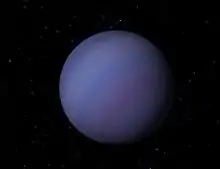 83 Leonis Bb rendered by Celestia | |
| Discovery | |
|---|---|
| Discovered by | Marcy, Butler, Vogt et al. |
| Discovery site | United States |
| Discovery date | 25 January 2005 |
| Doppler spectroscopy | |
| Orbital characteristics | |
| 0.12186 ± 0.00002 AU (18,230,000 ± 3,000 km)[1] | |
| Eccentricity | 0.13 ± 0.07[1] |
| 17.054 ± 0.003[1] d | |
| 2,450,449 ± 2[1] | |
| 196 ± 32[1] | |
| Semi-amplitude | 7.9 ± 0.6[1] |
| Star | 83 Leonis B |
83 Leonis Bb, also catalogued as HD 99492 b or abbreviated 83 Leo Bb, is an extrasolar planet with a minimum mass of 1.5 Neptune mass. It is located approximately 59 light-years away in the constellation of Leo (the Lion). The planet was discovered in January 2005 by the California and Carnegie Planet Search team, who use the Doppler spectroscopy method to detect planets.[2] It orbits in a close orbit around the star, completing one orbit in about 17 days.[1] The HARPS-N spectrograph discovered a second Neptune-like exoplanet in 2022 orbiting at 95 days.
See also
References
- 1 2 3 4 5 6 7 Meschiari, Stefano; et al. (2011). "The Lick-Carnegie Survey: Four New Exoplanet Candidates". The Astrophysical Journal. 727 (2). 117. arXiv:1011.4068. Bibcode:2011ApJ...727..117M. doi:10.1088/0004-637X/727/2/117. S2CID 59065004.
- ↑ Marcy, Geoffrey W.; et al. (2005). "Five New Extrasolar Planets". The Astrophysical Journal. 619 (1): 570–584. Bibcode:2005ApJ...619..570M. doi:10.1086/426384. S2CID 5803173.
External links
- "83 Leonis AB". SolStation. Archived from the original on 25 July 2008. Retrieved 2008-06-20.
- "Notes for planet HD 99492 b". Extrasolar Planets Encyclopaedia. Retrieved 2008-06-20.
This article is issued from Wikipedia. The text is licensed under Creative Commons - Attribution - Sharealike. Additional terms may apply for the media files.